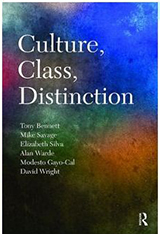The Great British Class Survey
 The Great British Class Survey, the largest study of class in the UK, has found the traditional working, middle and upper class distinctions to be outdated, and has identified a new model with seven social classes. More than 160,000 people were surveyed in this collaboration between the BBC and academics from six universities.
The Great British Class Survey, the largest study of class in the UK, has found the traditional working, middle and upper class distinctions to be outdated, and has identified a new model with seven social classes. More than 160,000 people were surveyed in this collaboration between the BBC and academics from six universities.
The survey draws predominantly on research from the Centre for Research on Socio-Cultural Change's Cultural Capital and Social Exclusion (CCSE) study, of which ICS's Professor Tony Bennett was Principal Investigator. The key publication from the CCSE study, Culture, Class, Distinction (opens in a new window), reviews French Sociologist Pierre Bourdieu's classic study of the relationships between culture and class and offers the first systematic assessment of the relationships between cultural practice and the social divisions of class, gender and ethnicity in contemporary Britain.
The notion that class relationships are constituted by the possession of different types of 'capital' was developed by the CCSE researchers, who examined the distribution of economic and social as well as cultural capital.
Drawing on this research, the Great British Class Survey used economic, social and cultural indicators rather than the traditional definitions of occupation, wealth and education to define the seven new classes: elite, established middle class, technical middle class, new affluent workers, traditional working class, emergent service workers, and precariat.
You can read more about the survey and its results on the links below.
- The Great British class calculator, BBC
- Great British Class Survey finds seven social classes in UK (opens in a new window), The Guardian
- New British class scale unveiled (opens in a new window), ABC
4 April 2013




